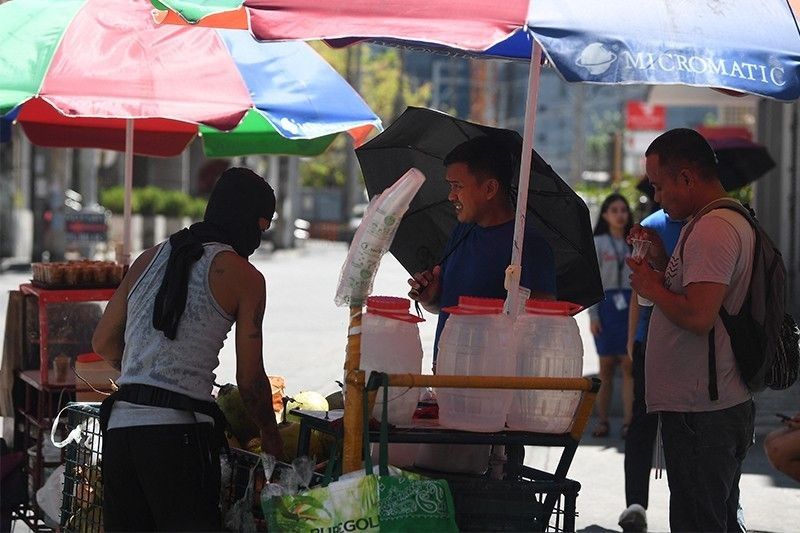103 areas under state of calamity due to heat

MANILA, Philippines — A total of 103 cities and towns have been placed under a state of calamity because of El Niño, while the number of persons affected by the weather phenomenon has reached 2.1 million, according to Task Force El Niño spokesman and Presidential Communications Assistant Secretary Joey Villarama.
Villarama said that among the affected areas are the provinces of Antique, Sultan Kudarat, Basilan, Maguindanao del Sur and Occidental Mindoro, which was visited by President Marcos last Tuesday.
“As of this morning, based on the data of OCD (Office of Civil Defense), 103 cities and municipalities (have declared a state of calamity),” Villarama said at a public briefing aired over state-run People’s Television yesterday.
“Actually, the President mentioned yesterday that almost the entire Philippines is affected. But again, in varying degrees, so the government is focused on providing assistance, depending on the needs of each province,” he added.
A state of calamity declaration will allow a local government to use its funds to mitigate the impact of El Niño.
Citing data from the social welfare department, Villarama said 2,116,420 people, including farmers, fisherfolk and their dependents, have been affected by El Niño, which is expected to persist until May or June.
The amount of damage caused by El Niño to the agriculture sector has risen to P3.94 billion, which is equivalent to 66,000 hectares.
However, 78 percent of the affected farmlands may still recover, Villarama said.
“By end of May, we hope that the impact of El Niño will dissipate or become less but our appeal to conserve our resources like power and water remains,” he added.
During his visit to San Jose, Occidental Mindoro last Tuesday, Marcos gave assurance that the government would continue providing assistance to communities and sectors hit by El Niño.
He said the country’s rice supply remains sufficient despite the drought and dry spell.
48 C heat index
The heat index in Aparri, Cagayan climbed to a sweltering 48 degrees Celsius on Tuesday, marking the hottest heat index logged so far this year.
The Philippine Atmospheric, Geophysical and Astronomical Services Administration said the highest heat index was recorded on April 23 in the municipality of Aparri. PAGASA said that it also monitored a heat index of 47 degrees in Dagupan City.
At least 30 areas in the country could experience dangerous heat levels today, as temperatures are expected to range between 42 to 45 degrees.
PAGASA warned dangerous and extreme danger heat indexes are expected in April and May. The bureau also warned of heat cramps and heat exhaustion, with heat stroke probable in continued exposure.
Classes suspended
A total of 6,695 out of 47,678 public schools nationwide suspended onsite classes yesterday due to extreme heat, latest figures from the Department of Education (DepEd) showed.
Based on data released by DepEd, all regions in the country have recorded class suspensions, with schools opting to shift to alternative delivery mode (ADM) of learning such as through online classes and use of modules.
The heat index in several parts of the country reached “danger” level ranging from 42 to 46 degrees Celsius.
Central Luzon has the highest number of schools suspending onsite classes at 1,731, followed by Western Visayas with 1,091 schools, Ilocos region (680), Central Visayas (470), Bicol (450) and Mimaropa (426).
A total of 415 public schools in Metro Manila have suspended their onsite classes and switched to ADM.
Suspension of onsite classes was also recorded in public schools in Calabarzon (395), Soccsksargen (335), Cordillera Administrative Region (229), Zamboanga peninsula (164), Eastern Visayas (117), Cagayan Valley (104), Davao region (84), Northern Mindanao (3) and Caraga (1).
“The number of schools implementing ADM has decreased compared to previous data,” the DepEd said.
More than 7,000 public schools suspended their onsite classes and switched to ADM last April 12 also due to extreme heat.
Face-to-face classes in all levels of both public and private schools have been suspended anew in the city of Manila until April 26, the local government announced after the heat index in the city was forecast to reach danger level at an estimated 44 degrees Celsius.
Navotas, Las Piñas, Pasay and Parañaque have also suspended face-to-face classes in all levels in both public and private schools until Friday due to extreme heat.
The city governments have advised school management to “shift to asynchronous classes” in the next two days.
DepEd denies teachers died of heatstroke
Meanwhile, DepEd has denied a local radio report saying that two teachers died of heatstroke while conducting classes.
In a statement issued on Tuesday night, the DepEd slammed as “highly inaccurate and misleading” the so-called breaking news report of XFM Radyo Patrol Iloilo saying that two teachers in Iloilo recently died of heatstroke while conducting classes.
“According to the Schools Division Office concerned, no teacher was reported to have died due to heatstroke,” the DepEd said.
The DepEd said that official records instead showed that a teacher in Sta. Barbara town passed away in February due to “hypertensive cardiovascular disease,” while another teacher died sometime March due to aneurysm.
“In both instances, the teachers were reportedly at home. It is unfortunate that certain news outlets resort to sensationalizing the death of our teachers at the expense of true and factual reporting,” the DepEd said. “Most importantly, DepEd extends its heartfelt condolences to the bereaved families.”
The Teachers’ Dignity Coalition and Alliance of Concerned Teachers have been calling on the DepEd for immediate reversion to the old academic calendar starting this coming school year 2024-2025, following the frequent suspension of onsite classes due to extreme summer heat aggravated by El Niño.
Meanwhile, Metro Pacific Water president and CEO Rogelio Singson said yesterday that the government should prioritize the establishment of water impounding systems instead of flood control measures to ensure the country’s water security.
Singson said the government needs to converge its flood control projects and irrigation programs to have a synchronized program in managing the country’s water resources.
Singson added that funds of the Department of Public Works and Highways and the National Irrigation Administration must be integrated to lead to a better water control program.
Impounding rainwater, Singson pointed out, would benefit the country in multiple ways: there would be available irrigation for farmers during the dry season, available bulk water supply for treatment and it would reduce flooding.
“Our priority should be water impounding and not flood control. Once you impound the water at the top then it would reduce the water at the downstream, resulting in fewer flooding,” he said during the Kapihan sa Manila Bay news forum.
“Let’s not burn our budget in dredging because nothing will happen. It will just use up our budget,” he added.
Singson recalled that he banned dredging during his stint as DPWH secretary since it will not lead to any improvements against flooding.
“If the budget is instead used for water impounding in several locations around river systems, then definitely, we will control flooding,” he said. – Romina Cabrera, Ghio Ong, Nillicent Bautista, Elizabeth Marcelo, Jasper Arcalas, Emmanuel Tupas
- Latest
- Trending































